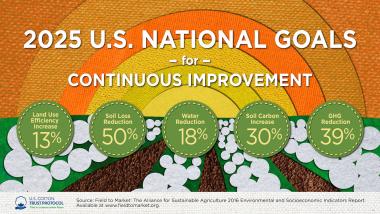U.S. Cotton Trust Protocol: new traceability tool for US cotton
Starting midth of July, brands and retailers can join the U.S. Cotton Trust Protocol, a new system for responsibly grown cotton that will provide annual data for six areas of sustainability in line with the UN Sustainability Goals. This year-on-year data available for the first time will allow brands and retailers to better measure progress towards meeting sustainability commitments.
The Trust Protocol underpins and verifies sustainability progress through sophisticated data collection and independent third-party verification. By working with Field to Market: The Alliance for Sustainable Agriculture and Control Union Certifications North America, the Trust Protocol enables brands and retailers to better track the cotton entering their supply chain. Brands who become members of the Trust Protocol will have access to aggregate year-over-year data on water use, greenhouse gas emissions, energy use, soil carbon and land use efficiency.
The Trust Protocol is a complement to existing sustainability programs and is designed from the ground up to fit the unique cotton mass-growing environment of the United States.
Last month the Trust Protocol was added to Textile Exchange’s list of 36 preferred fibres and materials that more than 170 participating brands and retailers can select from as part of Textile Exchange’s Material Change Index programme.
Hill+Knowlton Strategies GmbH









